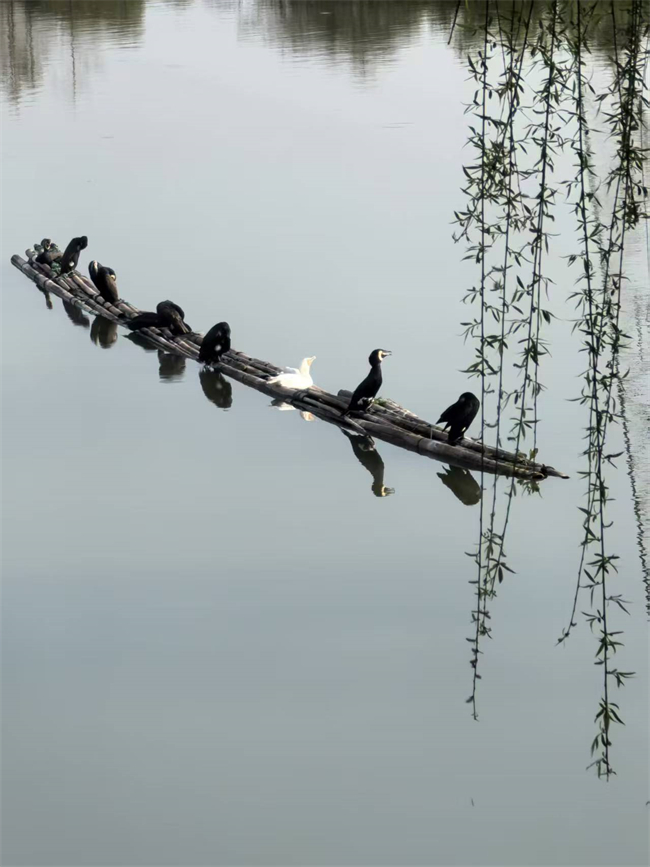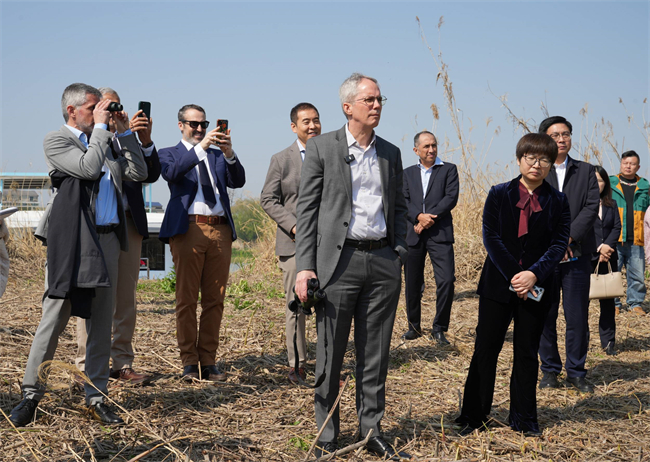As sunset fades, 29-year-old Ding Huimin serves steaming tea to guests at her riverside bistro, the Youdu Country Music Bar, in Xiaohezui village, central China's Hunan Province. The air is filled with folk melodies drifting over the water, intertwined with the quiet songs of birds. This harmonious scene, once unimaginable, now pulses with life.
A new journey of a fisherman's daughter
"Growing up, my days began with the smell of fishnets," Ding recalls, whose family once relied on fishing in these waters.

Ding Huimin serves cups of tea for guests at the Youdu Country Music Bistro in Xiaohezui village, Qionghu subdistrict of Yuanjiang city, central China's Hunan Province. (Photo/ADB)
Like many in Xiaohezui village — part of Yuanjiang city's Qionghu subdistrict in Hunan, within the South Dongting Lake wetland restoration project area — Ding's journey reflects China's efforts to balance ecological renewal with rural revitalization.
Once a community where families rose before dawn to cast nets, the 2020 Yangtze fishing ban prompted drastic changes.

Photo shows birds in Xiaohezui village, Qionghu subdistrict of Yuanjiang city, central China's Hunan Province. (People's Daily Online/Zhong Wenxing)
For Ding's parents, lifelong fishermen, the transition was daunting. "We feared losing our livelihood, and there was widespread dissatisfaction," she says. Yet, as the village's ecological environment improved, the former fishing village transformed into a tourism and cultural hub.
Through government subsidies and vocational training, former fishermen successfully transitioned into new roles like becoming tourism entrepreneur, running farmhouse restaurants, and participating in village projects.
Ding established her bistro three years ago with a business loan, which is nearly paid off due to her successful management. The bistro employs 10 people and sells agricultural products from nearby farms. On weekends, it consistently fills to capacity, attracting over 200 visitors drawn by the restored wetland ecosystem and live performances.
Policy meets technology
Dongting Lake, China's second-largest freshwater lake, plays a crucial role in regulating and storing water from the Yangtze River and rivers in Hunan. In its southwest, the South Dongting Lake Nature Reserve was established on a 8,0100-hectare area to safeguard complex wetland ecosystems, including lakes, rivers, marshes, and habitats for rare and endangered wildlife.
Most of the reserve's core area — 88 percent — falls within Yuanjiang city.

Photo shows a group of swans at the South Dongting Lake Nature Reserve, in Yuanjiang city, central China's Hunan Province. (Photo/South Dongting Lake Nature Reserve)
Xia Xin, Yuanjiang's executive vice mayor, outlined three key policy pillars: improving an ecological compensation mechanism that requires developers to implement biodiversity conservation, compensation, and restoration measures for all wetland-related projects; mandating equivalent habitat restoration for any wetland encroachment; and listing strictly banned activities harming wetlands.
Xia told People's Daily Online that local authorities have formed a joint task force integrating agriculture, forestry, wetland, and environmental agencies to tackle wetland issues.
A smart management platform uses big data and remote sensing to monitor the wetlands in real time. "Technological support ensures no area goes unprotected," Xia added.
Wang Long, office director of the Yuanjiang Management Bureau for South Dongting Lake Nature Reserve, reported that migratory bird populations of the South Dongting Lake have nearly quadrupled from 30,000 in 2018 to 123,000 in 2024. This year, over 120,000 visiting birds were recorded, serving as a strong indicator of the lake's recovery.

Li Jianzhi, president of Yuanjiang's Environmental Protection Volunteer Association, is interviewed on March 21, 2025. (Photo/ADB)
Local conservationists like Li Jianzhi, president of Yuanjiang's Environmental Protection Volunteer Association, have documented the resurgence. "In 2023, I photographed nine new bird species here," Li said.
He is also the author of "Birds of Dongting Lake," a book that introduces over 300 bird species found around the lake. In September 2024, he even spotted the endangered glossy ibis — a first for the region.
Global collaboration for wetland revival
These local innovations are now attracting global attention and funding. The South Dongting Lake wetland restoration and sustainable development project has drawn in global partners. An inauguration ceremony for the Asian Development Bank (ADB) and French Development Agency (AFD) loan project took place on March 21, 2025, in Yuanjiang.
It includes a $150 million ADB loan equivalent, matched by an equivalent of $65 million from the AFD.

Asian Development Bank Vice President Scott Morris (in the middle) visits a wetland ecological restoration demonstration site, in Yuanjiang, central China's Hunan province, on March 21, 2025. (Photo/ADB)
The ADB identified the project as the first flagship investment under its Regional Flyways Initiative (RFI). ADB Vice President Scott Morris highlighted the RFI's potential to set a precedent for balancing ecological preservation and economic growth across more than 20 Asia-Pacific countries.
The initiative was launched at the Ecological Civilization Forum of the 15th Conference of Parties to the Convention on Biological Diversity (COP15) in Kunming, southwest China's Yunnan Province, in 2021.
Morris underscored that South Dongting Lake — a critical habitat for migratory birds and endangered species — has shown progress in ecosystem restoration, including increased biodiversity of birds, fish, and plant life.
"This project is a living example of how wetland protection can coexist with human development," Morris stated, emphasizing its role as a replicable model for other regions.
"By proving that environmental stewardship benefits livelihoods, we align local communities with long-term ecological goals," Morris explained.
China was chosen as the initiative's launch site due to its high capacity, technical ability, and local partners' financial commitment. "China's ability to deliver quick, visible results lets us scale this model confidently to other countries," Morris noted.

Photo shows Hulu Lake at the South Dongting Lake Nature Reserve, in Yuanjiang city, central China's Hunan Province. (Photo/ADB)
As dusk falls on the lake, Ding prepares for another lively night at her bistro. Above, birds glide toward the restored marshes. Here, every birdsong echoes a lesson: When nature thrives, so do its people.
Source: People's Daily Online








